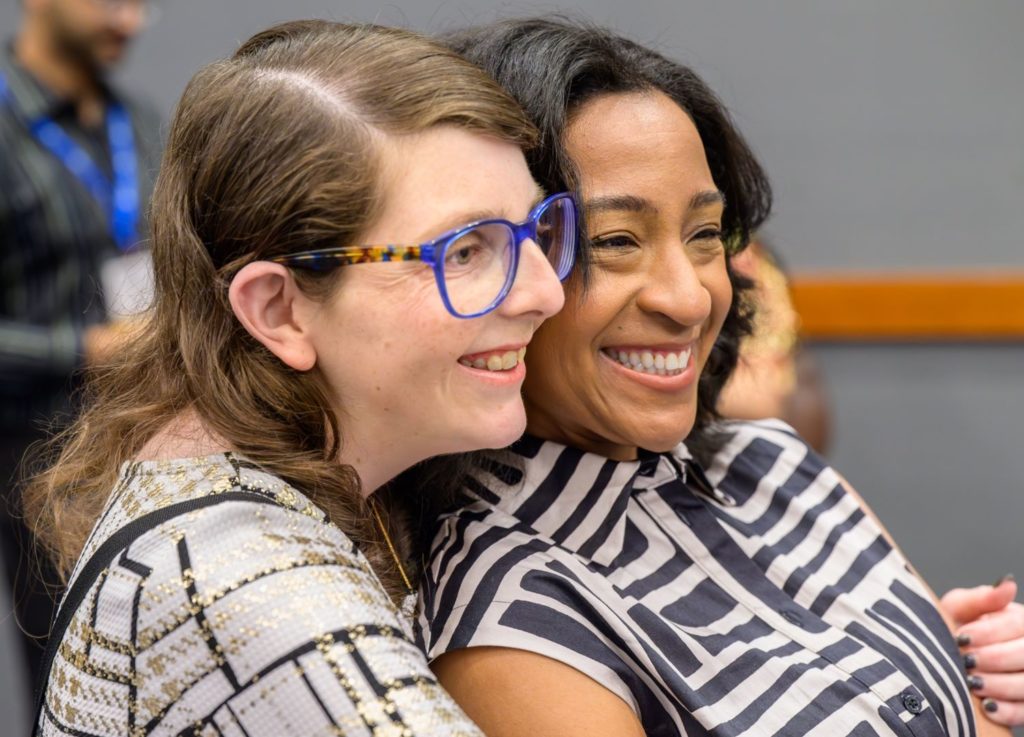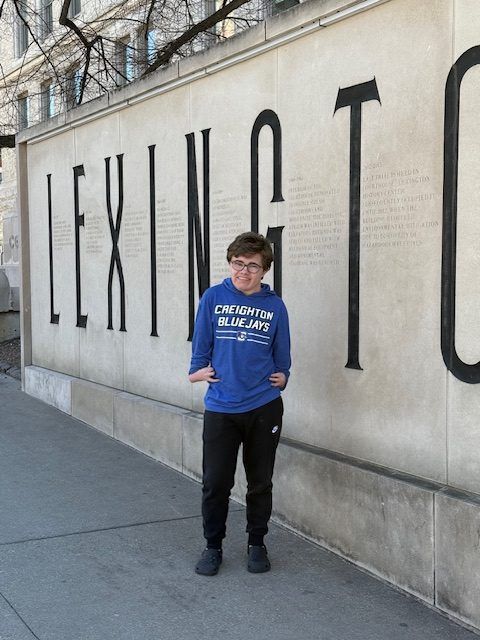The Latest on FA Research
Research is the answer to one day making FA a treatable, manageable disease.
Here, you’ll discover the most recent strides in FA research and activities funded by FCF. Every quarter, we’ll bring you updates on newly funded grants, ongoing projects, and significant milestones.
None of this progress would be possible without the unwavering support of our generous donors, fundraisers, and passionate researchers. Join us in fueling this vital research by making a gift today.
Last updated: December 31, 2025
Projects Awarded in 2025
Testing Chemoprevention Approaches for Oral Cancer
Investigators: Agata Smogorzewska, MD, PhD and Rachel Uppgaard, DDS
Institution: The Rockefeller University and University of Minnesota
Amount Funded: $250,000
With a 500–700 times greater risk of head and neck squamous cell carcinoma, individuals with FA face a pressing need for prevention strategies. Building on findings from FCF’s collaboration with Stand Up to Cancer, this multi-institute clinical trial evaluates naproxen and metformin as potential chemopreventive drugs for oral cancer. The study will assess both safety and biological markers of cancer prevention, establishing the framework for future chemoprevention trials in FA.
Development of Translational Read-Through-Inducing Drugs for Fanconi Anemia Caused by Nonsense Mutations
Investigators: Marco Cipolli, MD and Valentino Bezzerri, PhD
Institution: Azienda Ospedaliera Universitaria Integrata, Verona
Amount Funded: $129,210
This project focuses on finding new treatments for people with Fanconi anemia (FA) that can protect healthy stem cells, stabilize DNA, and delay the development of cancer. Drs. Cipolli and Bezzerri are testing new types of drugs designed to “read through” genetic stop signals, stabilize faulty genetic messages, and restore missing proteins. These drugs—called translational read-through–inducing drugs (TRIDs), nonsense-mediated decay (NMD) inhibitors, and anticodon-engineered tRNAs (ACE-tRNAs)—may help correct the effects of certain genetic mutations found in about 20–30 percent of people with FA.
The researchers aim to restore normal FA protein function by combining these drugs in cells derived from individuals with FA. If successful, this approach could lead to new treatment options for many people with FA and could eventually be applied to other bone marrow failure disorders.
Cancer Prevention in Fanconi Anemia through Alleviating Formaldehyde Genotoxicity
Investigator: Meng Wang, MD, PhD
Institution: Weill Cornell University
Amount Funded: $488,000
This Fanconi Cancer-AACR NextGen Grant for Transformative Cancer Research was awarded in 2024 in collaboration with the American Association of Cancer Research and focuses on cancer prevention in FA individuals by investigating specific nutritional and metabolic pathways. Utilizing both animal models and FA patient samples, Dr. Wang is studying the pathways that regulate the production of aldehydes, organic compounds naturally produced in the body during metabolic processes. This work aims to target metabolic and nutritional pathways for novel cancer prevention in FA patients.
Fanconi Anemia Cancer Consortium (FACC)
Investigators: Martial Guillaud, PhD; Denise Laronde, PhD; Neelam Giri, MD; Lisa McReynolds, MD, PhD; Eunike Velleuer-Carlberg, MD; Christine Krieg; Agata Smogorzewska, MD, PhD; Alfredo Rodriguez, PhD;
Institutions: B.C. Cancer; NIH; Children’s Hospital, Department for Pediatric Haemato-Oncology, Krefeld, Germany; University of Düsseldorf, German Fanconi Anemia Family Group and Research Fund; The Rockefeller University; National Autonomous University of Mexico
Supplemental funding awarded in 2025
The FACC is an FCF-funded collaborative partnership between interdisciplinary cancer research teams, the FA community, and a network of clinicians and physician scientists who have expertise in FA cancer research and the diagnosis and treatment of FA cancers. Several FACC researchers were recently awarded supplemental funding from FCF to continue their research efforts on a variety of topics ranging from early cancer detection/screening to patient education and advocacy. Researchers from the FACC will be attending FCF’s upcoming Scientific Symposium and FA adult retreat to share their research and offer brush biopsies to FA individuals in attendance.
Small Molecule Screening in Fanconi Anemia Mice
Investigators: Markus Grompe, MD and Craig Dorrell, PhD
Institution: Oregon Health and Science University
Amount Funded: $215,991
This newly funded research project aims to better understand prevention and treatment of squamous cell carcinoma (SCC) oral cancer in FA. By utilizing FA mouse models, these researchers can determine which medications are the safest and most effective at treating oral cancer in people with FA. This research project will screen cancer chemotherapy drugs for FA-specific toxicity as well as screening small molecules for cancer chemoprevention drugs in mouse models of FA. Together, this work will inform future clinical trials for oral cancer treatment and SCC chemoprevention in FA.
Oral Cavity Gene Therapy
Investigator: Markus Grompe
Institution: Oregon Health and Science University
Amount Funded: $91,173
FA patients are at a high risk for SCC and this recently funded research project explores oral cavity gene therapy in mouse models of FA. The ability to utilize oral cavity gene therapy would revolutionize oral cancer prevention strategies in FA. However, it is necessary to determine the feasibility of this approach first in animal models before developing this method for human FA patients, which is what this work aims to do.
Modeling environmental responses of Fanconi anemia epithelial stem and progenitor cells to prevent squamous cell carcinoma
Investigators: Joel Walker Ideas Lab Team: Kenneth Weinberg, MD and Hiroshi Nakagawa, MD, PhD
Institutions: Stanford University; Columbia University
Supplemental funding awarded in 2025
This research project, first funded in 2022, created new models to prevent SCC, studying how this cancer develops in the mouth and esophagus while simultaneously testing potential drugs to stop cancer growth. FCF’s original funding allowed Dr. Weinberg and Dr. Nakagawa to make incredible strides in data collection and tool development for this project. Now with newly awarded supplemental funding, this work continues to identify potential cancer stem cells for FA associated SCCs, testing new SCC-inhibiting drugs, and applying findings from mouse models to human samples. Together, this work will help other researchers detect similar cancer types in their studies and test new ways to treat/prevent SCCs before they become advanced.
Fanconi Anemia Research Materials Program (FARM)
Investigators: Markus Grompe, MD and Leslie Wakefield
Institution: Oregon Health and Science University
Supplemental funding awarded in 2025
This research program, first funded in 2023, focuses on advancing FA research through the distribution of established Fanconi anemia related cell lines and antibodies. This work continues through supplemental funding from FCF which supports facilitation of distribution of research materials throughout the FA research community.
Projects that Wrapped Up in 2025
Projects to be added once they are completed.
Updates From Ongoing Projects
Spatial Analysis of FA Tumors for Detection of Their Immune Repertoire and Potential Actionable Targets
Investigator: Alfredo Rodríguez, PhD
Institution: National Autonomous University of Mexico
Funded in 2024
This recently funded research project aims to better understand the cellular make up of SCC in patients with FA. SCC tumors are comprised of many different cell types; of particular interest to this study are immune cells. By utilizing advanced imaging techniques, Rodriguez’s team hopes to uncover cellular interactions in these tumors and use that understanding to discover new cancer treatments for FA patients. In both human and mouse models, this group has found unique groupings of immune cells that help these tumors evade immune system detection. This continuing work offers incredible insights into how the immune system interacts with cancer cells and could lead to new targets for immunotherapy in FA patients with SCC.
Transforming treatment of inherited bone marrow failure in Fanconi anemia by precise in vivo genome editing
Investigators: Paula Rio, PhD; David Liu, PhD; Jacob Corn, PhD; Andrew Deans, PhD; Hans-Peter Kiem, PhD; Branden Moriarity, PhD; Toni Cathomen, PhD
Institutions: Instituto de Investigación Sanitaria Fundación Jiménez Díaz; Harvard University; ETH Zurich; St. Vincent’s Institute Fitzroy; Fred Hutch Cancer Center; University of Minnesota; University of Freiburg, Institute for Transfusion Medicine and Gene Therapy
Funded in 2023-24
This multi-investigator research project focuses on gene editing strategies for FA. Hematopoietic stem cells (HSCs) in individuals with FA are greatly affected by bone marrow failure, resulting in fewer HSC reserves. To overcome this, this project is developing in-vivo gene editing strategies which reduce associated HSC risks and allow for increased treatment accessibility. Recently this group has optimized gene editing tools to correct specific mutations found in FA patients. Additionally, this team has created the necessary models to test these gene editing tools using various delivery methods.
NIH Center Comprehensive Program for Natural History of Development of Squamous Cell Carcinoma in Fanconi Anemia
Investigators: Neelam Giri, MD and Sharon Savage, MD
Institution: Clinical Genetics Branch, National Cancer Institute NIH
Funded in 2022
This research project established a central facility and team of expert clinicians and scientists at the NIH to conduct comprehensive longitudinal cancer screening of individuals with FA who are at high risk of SCC. This study utilizes detailed clinical evaluations, biospecimen collection, and a recently developed tissue repository to facilitate collaborative studies within the FA research community. More than 80 participants are enrolled and 30+ FA patients have been evaluated at the NIH, resulting in numerous brush biopsy samples from oral lesions. This research project has also fostered numerous collaborations with other FA researchers across the world including psychosocial researchers who are exploring screening-related anxiety in FA patients.
Cytology Based DNA Analysis to Investigate the Malignant Potential of Oral Lesions in Patients with Fanconi Anemia
Investigators: Martial Guillaud, PhD and Denise Laronde, PhD
Institution: BC Cancer Research Institute
Funded in 2022
The goal of this research project is to detect oral premalignant disease in FA patients using samples collected through non-invasive brush biopsy. Dr. Guillaud and Dr. Laronde have made great progress on this work using automated detection of individual high-risk oral lesions in FA patients. This project is partnered with the FA NIH longitudinal study (update above) and automated DNA detection findings have been integrated into the main NIH database. Additionally, these researchers are working on DNA software that will be of use to other investigators in the FA community.
Fanconi Anemia Data Commons (FRIENDS)
Investigator: Sam Volchenboum, MD, PhD
Institution: University of Chicago
Funded in 2023
The FA Data Commons project establishes a platform for the FA research community to search, analyze, and share data for discovery of new pathways to treatment and cure of FA. The data commons currently has 13 institutions from all over the world contributing data. This research group has been working together to create a data dictionary consisting of many high priority issues for the FA community such as bone marrow failure, Fanconi Associated Neurological Syndrome (FANS), cancer, fertility, and psychosocial impacts. For more information about this project check out the FRIENDS page.
Updates on Other Research Initiatives
Updates to be added once they are available.




